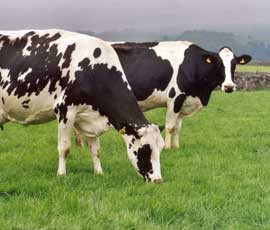Call for farm worker tests after MRSA discovery

Dairy farmers and farm workers should all be tested for MRSA after a new strain of the superbug was found in herds in England, the Soil Association has said.
The previously undiscovered strain of the bug was found by scientists during an investigation into the spread of mastitis in dairy herds.
Tests in herds across England found 15 other cases of the bacterium present in milk, raising concerns that cattle could be a reservoir for the bug.
Scientists are also concerned cattle could be responsible for passing the disease on to humans after people across the UK as well as Germany, Ireland and Denmark tested positive for the bug.
The Soil Association said the new strain of MRSA had emerged on dairy farms because of the routine use of antibiotics to deal with health problems associated with high-yielding cows. MRSA develops when bacteria mutates, which allow it to develop a resistance to antibiotics.
The organisation said the government must review its decision to allow advertising of antibiotics to farmers so that antibiotic use was not encouraged.
“This new evidence confirms our long-held view of the importance of absolutely minimising the use of antibiotics,” said Helen Browing, Soil Association director. “In the relentless drive for increased productivity and under acute price pressure, dairy systems are becoming ever more antibiotic dependent.
“We need to get farmers off this treadmill, even if that means milk has to cost a few pennies more.”
Mrs Brown said a “comprehensive programme” to test farm workers and vets for MRSA should now be introduced urgently. Tests on farm animals, milk, meat and farm waste should also be carried out, she added.
NFU chief dairy adviser, Rob Newbery, said high standards on dairy farms meant the discovery of the new MRSA strain should not cause concern for consumers. “Dairy farmers and stockmen are highly trained individuals and take their role as food producers seriously,” he said. “They maintain excellent levels of hygiene through farm assurance standards, which set rules for food production from farm through to pack.”
The rules insisted farm workers wore suitable clothing, had clean arms and hands and kept wounds or open cuts covered, he said.
“The NFU is a founding member of the Responsible Use of Medicines in Agriculture Alliance and fully endorses, on our members’ behalf, the principle of appropriate use of veterinary medicines, including antibiotics,” he added.
“In the interests of human and animal health and animal welfare, it is important that veterinary medicines are administered as little as possible, but as much as necessary.
“Any antibiotic or veterinary medicine being administered to a food-producing animal has strict conditions of use, including milk and meat withdrawal times and in general, under European law, would only be available under prescription.”
